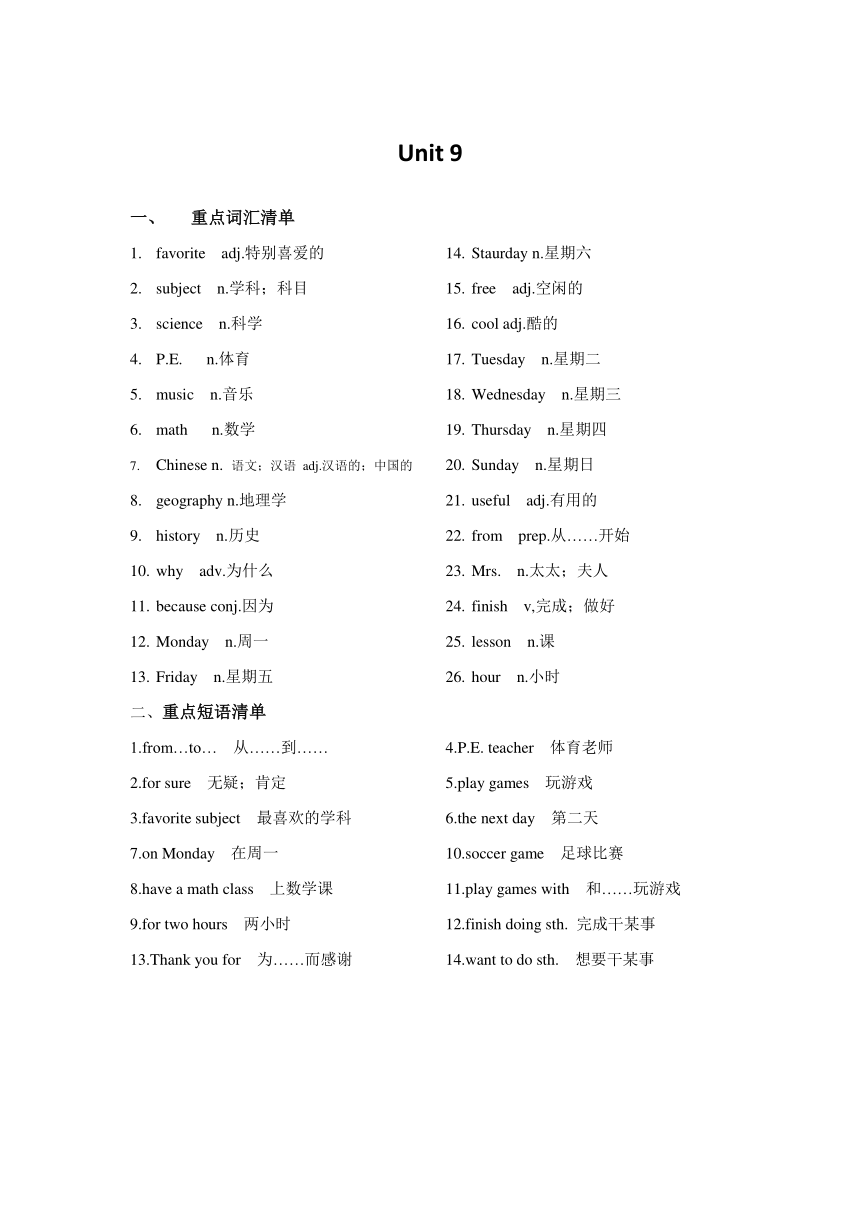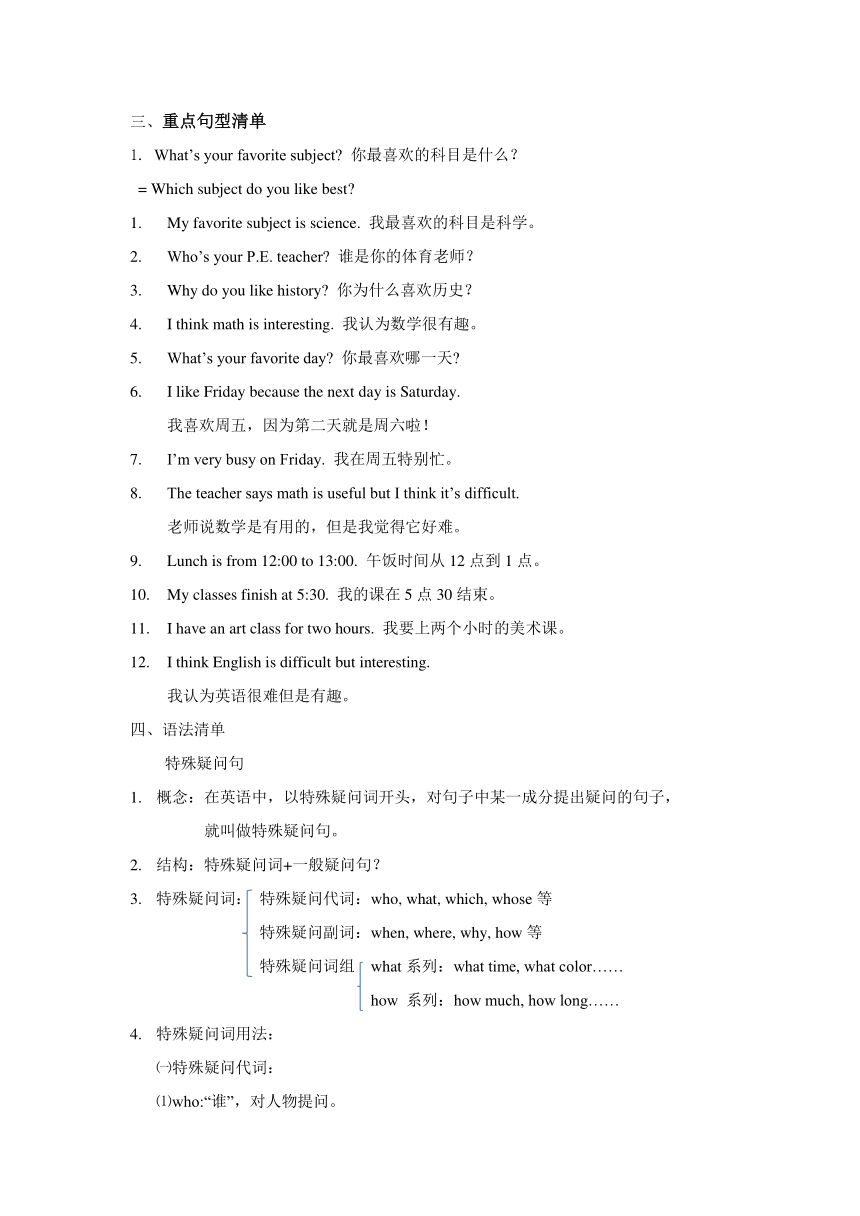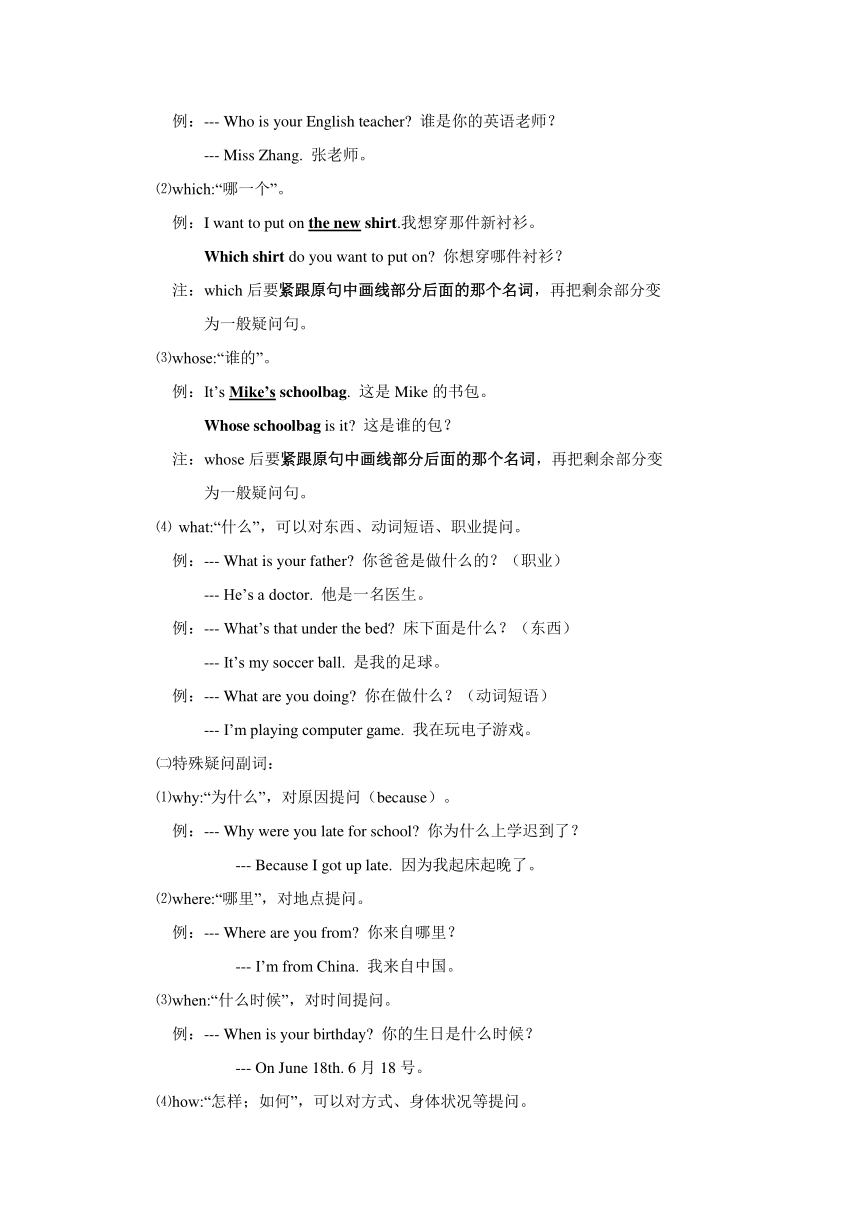人教版七年级英语上册Unit 9My favorite subject is science知识点总结学案
文档属性
| 名称 | 人教版七年级英语上册Unit 9My favorite subject is science知识点总结学案 |

|
|
| 格式 | docx | ||
| 文件大小 | 46.8KB | ||
| 资源类型 | 教案 | ||
| 版本资源 | 人教新目标(Go for it)版 | ||
| 科目 | 英语 | ||
| 更新时间 | 2023-12-05 00:00:00 | ||
图片预览



文档简介
Unit 9
重点词汇清单
favorite adj.特别喜爱的
subject n.学科;科目
science n.科学
P.E. n.体育
music n.音乐
math n.数学
Chinese n. 语文;汉语 adj.汉语的;中国的
geography n.地理学
history n.历史
why adv.为什么
because conj.因为
Monday n.周一
Friday n.星期五
Staurday n.星期六
free adj.空闲的
cool adj.酷的
Tuesday n.星期二
Wednesday n.星期三
Thursday n.星期四
Sunday n.星期日
useful adj.有用的
from prep.从……开始
Mrs. n.太太;夫人
finish v,完成;做好
lesson n.课
hour n.小时
二、重点短语清单
1.from…to… 从……到……
2.for sure 无疑;肯定
3.favorite subject 最喜欢的学科
4.P.E. teacher 体育老师
5.play games 玩游戏
6.the next day 第二天
7.on Monday 在周一
8.have a math class 上数学课
9.for two hours 两小时
10.soccer game 足球比赛
11.play games with 和……玩游戏
12.finish doing sth. 完成干某事
13.Thank you for 为……而感谢
14.want to do sth. 想要干某事
三、重点句型清单
1. What’s your favorite subject 你最喜欢的科目是什么?
= Which subject do you like best
My favorite subject is science. 我最喜欢的科目是科学。
Who’s your P.E. teacher 谁是你的体育老师?
Why do you like history 你为什么喜欢历史?
I think math is interesting. 我认为数学很有趣。
What’s your favorite day 你最喜欢哪一天
I like Friday because the next day is Saturday.
我喜欢周五,因为第二天就是周六啦!
I’m very busy on Friday. 我在周五特别忙。
The teacher says math is useful but I think it’s difficult.
老师说数学是有用的,但是我觉得它好难。
Lunch is from 12:00 to 13:00. 午饭时间从12点到1点。
My classes finish at 5:30. 我的课在5点30结束。
I have an art class for two hours. 我要上两个小时的美术课。
I think English is difficult but interesting.
我认为英语很难但是有趣。
四、语法清单
特殊疑问句
概念:在英语中,以特殊疑问词开头,对句子中某一成分提出疑问的句子,
就叫做特殊疑问句。
结构:特殊疑问词+一般疑问句?
特殊疑问词: 特殊疑问代词:who, what, which, whose等
特殊疑问副词:when, where, why, how等
特殊疑问词组 what系列:what time, what color……
how 系列:how much, how long……
特殊疑问词用法:
㈠特殊疑问代词:
⑴who:“谁”,对人物提问。
例:--- Who is your English teacher 谁是你的英语老师?
--- Miss Zhang. 张老师。
⑵which:“哪一个”。
例:I want to put on the new shirt.我想穿那件新衬衫。
Which shirt do you want to put on 你想穿哪件衬衫?
注:which后要紧跟原句中画线部分后面的那个名词,再把剩余部分变
为一般疑问句。
⑶whose:“谁的”。
例:It’s Mike’s schoolbag. 这是Mike的书包。
Whose schoolbag is it 这是谁的包?
注:whose后要紧跟原句中画线部分后面的那个名词,再把剩余部分变
为一般疑问句。
⑷ what:“什么”,可以对东西、动词短语、职业提问。
例:--- What is your father 你爸爸是做什么的?(职业)
--- He’s a doctor. 他是一名医生。
例:--- What’s that under the bed 床下面是什么?(东西)
--- It’s my soccer ball. 是我的足球。
例:--- What are you doing 你在做什么?(动词短语)
--- I’m playing computer game. 我在玩电子游戏。
㈡特殊疑问副词:
⑴why:“为什么”,对原因提问(because)。
例:--- Why were you late for school 你为什么上学迟到了?
--- Because I got up late. 因为我起床起晚了。
⑵where:“哪里”,对地点提问。
例:--- Where are you from 你来自哪里?
--- I’m from China. 我来自中国。
⑶when:“什么时候”,对时间提问。
例:--- When is your birthday 你的生日是什么时候?
--- On June 18th. 6月18号。
⑷how:“怎样;如何”,可以对方式、身体状况等提问。
例:--- How do you go to school 你怎样去上学?(上学的方式)
--- By bike. 骑自行车。
例:--- How are you feeling now 你现在感觉怎么样?(身体状况)
--- I feel a little sick. 我感觉有点恶心。
㈢特殊疑问词组:
⑴what系列:
①what time:“几点了”,对具体的时刻,即几点几分提问。
例:--- What time is it now 现在几点了?
--- It’s 3:25 o’clock. 三点二十五了。
②what color:“什么颜色”,对颜色提问。
例:--- What color is your new skirt 你的新短裙是什么颜色?
--- It’s purple. 是紫色的。
③what size:“多大尺码”,对衣服、鞋子等的尺码提问。
例:--- What size is your coat 你的外套多大码的呀?
--- Size M. 中码。
③what day:“星期几了”,对星期提问。
例:It’s Monday today. 今天星期一。(画线部分提问)
What day is it today 今天星期几了?
④记住一个句型:What’s the date today 今天几月几号?对日期提问
例:It’s February 19th today.今天2月19号了。(画线部分提问)
What’s the date today 今天几月几号了?
⑵how系列:
①how many:“多少”,对可数名词的数量提问。
例:I have five books in my bag.(画线部分提问)
How many books do you have in your bag
注:How many 后要紧跟原句中画线部分后面的那个名词,再把剩余部分变 为一般疑问句。
②how much:
【1】“多少”,对不可数名词的数量提问。
例:There is some water in my cup.我杯子里还有一些水。
How much water is there in your cup 你杯子里有多少水?
注:How much 后要紧跟原句中画线部分后面的那个名词,再把剩余部分变为一般疑问句。
【2】“多少钱”,对价格提问。
例:Your new bike is 450 yuan. 这辆新自行车450元。
How much is your new bike
③how often:“多久一次”,对频率提问。
常见表频率的词:
【1】频度副词:always usually often sometimes seldom never
总是 通常 经常 有时候 很少 从不
【2】频率短语:once a week, twice a month, three times a year
一周一次 一个月两次 一年三次
【3】every系列:every day/week/month/Monday/morning…
每天 / 周 / 月 / 周一 / 上午 ……
例:My grandpa takes exercise every day.
我爷爷每天锻炼身体。
How often does your grandpa take exercise
你爷爷多久锻炼一次身体?
④how soon:“多久以后”,提问in+一段时间。
例:Our math teacher will come back to school in 5 days.
我们数学老师在5天后会返回学校。
How soon will your math teacher come back to school
注:in+一段时间,表“……以后”,和一般将来时连用。
in two years:两年后 in 3 days:三天后
⑤how long:“多长时间”,提问for+一段时间。
例:The Smiths have lived in Beijing for 20 years.
史密斯一家人在北京居住了20年了。
How long have the Smiths live in Beijing
史密斯一家人在北京住了多长时间了?
注:for+一段时间,与现在完成时连用。
⑥how far:“多远”,提问距离。
例:My home is 2 kilometers away from my school.
我家离学校2千米。
How long is your home away from your school
你家离学校有远?
注:用时间表距离:
ten minutes’walk 十分钟的步行
15 minutes’drive 15分钟的驾车
对此类短语提问也用how long。
陈述句变特殊疑问句方法:
①一定:根据画线部分,确定特殊疑问词,放到句首;
②二删:删除画线部分(因为特殊疑问词代替了画线部分);
③三变:把句子剩余部分变为一般疑问句,写在特殊疑问词后面。
④注意:which 哪一个
whose 谁的 后要紧跟画线部分后的名词,再加一般疑问句
how many 多少
how much 多少
(how much只有译为“多少”时才需紧跟画线部分后的名词,再加一般疑问句;当译为“多少钱”时,后面直接加一般疑问句即可。)
(北京)股份有限公司
重点词汇清单
favorite adj.特别喜爱的
subject n.学科;科目
science n.科学
P.E. n.体育
music n.音乐
math n.数学
Chinese n. 语文;汉语 adj.汉语的;中国的
geography n.地理学
history n.历史
why adv.为什么
because conj.因为
Monday n.周一
Friday n.星期五
Staurday n.星期六
free adj.空闲的
cool adj.酷的
Tuesday n.星期二
Wednesday n.星期三
Thursday n.星期四
Sunday n.星期日
useful adj.有用的
from prep.从……开始
Mrs. n.太太;夫人
finish v,完成;做好
lesson n.课
hour n.小时
二、重点短语清单
1.from…to… 从……到……
2.for sure 无疑;肯定
3.favorite subject 最喜欢的学科
4.P.E. teacher 体育老师
5.play games 玩游戏
6.the next day 第二天
7.on Monday 在周一
8.have a math class 上数学课
9.for two hours 两小时
10.soccer game 足球比赛
11.play games with 和……玩游戏
12.finish doing sth. 完成干某事
13.Thank you for 为……而感谢
14.want to do sth. 想要干某事
三、重点句型清单
1. What’s your favorite subject 你最喜欢的科目是什么?
= Which subject do you like best
My favorite subject is science. 我最喜欢的科目是科学。
Who’s your P.E. teacher 谁是你的体育老师?
Why do you like history 你为什么喜欢历史?
I think math is interesting. 我认为数学很有趣。
What’s your favorite day 你最喜欢哪一天
I like Friday because the next day is Saturday.
我喜欢周五,因为第二天就是周六啦!
I’m very busy on Friday. 我在周五特别忙。
The teacher says math is useful but I think it’s difficult.
老师说数学是有用的,但是我觉得它好难。
Lunch is from 12:00 to 13:00. 午饭时间从12点到1点。
My classes finish at 5:30. 我的课在5点30结束。
I have an art class for two hours. 我要上两个小时的美术课。
I think English is difficult but interesting.
我认为英语很难但是有趣。
四、语法清单
特殊疑问句
概念:在英语中,以特殊疑问词开头,对句子中某一成分提出疑问的句子,
就叫做特殊疑问句。
结构:特殊疑问词+一般疑问句?
特殊疑问词: 特殊疑问代词:who, what, which, whose等
特殊疑问副词:when, where, why, how等
特殊疑问词组 what系列:what time, what color……
how 系列:how much, how long……
特殊疑问词用法:
㈠特殊疑问代词:
⑴who:“谁”,对人物提问。
例:--- Who is your English teacher 谁是你的英语老师?
--- Miss Zhang. 张老师。
⑵which:“哪一个”。
例:I want to put on the new shirt.我想穿那件新衬衫。
Which shirt do you want to put on 你想穿哪件衬衫?
注:which后要紧跟原句中画线部分后面的那个名词,再把剩余部分变
为一般疑问句。
⑶whose:“谁的”。
例:It’s Mike’s schoolbag. 这是Mike的书包。
Whose schoolbag is it 这是谁的包?
注:whose后要紧跟原句中画线部分后面的那个名词,再把剩余部分变
为一般疑问句。
⑷ what:“什么”,可以对东西、动词短语、职业提问。
例:--- What is your father 你爸爸是做什么的?(职业)
--- He’s a doctor. 他是一名医生。
例:--- What’s that under the bed 床下面是什么?(东西)
--- It’s my soccer ball. 是我的足球。
例:--- What are you doing 你在做什么?(动词短语)
--- I’m playing computer game. 我在玩电子游戏。
㈡特殊疑问副词:
⑴why:“为什么”,对原因提问(because)。
例:--- Why were you late for school 你为什么上学迟到了?
--- Because I got up late. 因为我起床起晚了。
⑵where:“哪里”,对地点提问。
例:--- Where are you from 你来自哪里?
--- I’m from China. 我来自中国。
⑶when:“什么时候”,对时间提问。
例:--- When is your birthday 你的生日是什么时候?
--- On June 18th. 6月18号。
⑷how:“怎样;如何”,可以对方式、身体状况等提问。
例:--- How do you go to school 你怎样去上学?(上学的方式)
--- By bike. 骑自行车。
例:--- How are you feeling now 你现在感觉怎么样?(身体状况)
--- I feel a little sick. 我感觉有点恶心。
㈢特殊疑问词组:
⑴what系列:
①what time:“几点了”,对具体的时刻,即几点几分提问。
例:--- What time is it now 现在几点了?
--- It’s 3:25 o’clock. 三点二十五了。
②what color:“什么颜色”,对颜色提问。
例:--- What color is your new skirt 你的新短裙是什么颜色?
--- It’s purple. 是紫色的。
③what size:“多大尺码”,对衣服、鞋子等的尺码提问。
例:--- What size is your coat 你的外套多大码的呀?
--- Size M. 中码。
③what day:“星期几了”,对星期提问。
例:It’s Monday today. 今天星期一。(画线部分提问)
What day is it today 今天星期几了?
④记住一个句型:What’s the date today 今天几月几号?对日期提问
例:It’s February 19th today.今天2月19号了。(画线部分提问)
What’s the date today 今天几月几号了?
⑵how系列:
①how many:“多少”,对可数名词的数量提问。
例:I have five books in my bag.(画线部分提问)
How many books do you have in your bag
注:How many 后要紧跟原句中画线部分后面的那个名词,再把剩余部分变 为一般疑问句。
②how much:
【1】“多少”,对不可数名词的数量提问。
例:There is some water in my cup.我杯子里还有一些水。
How much water is there in your cup 你杯子里有多少水?
注:How much 后要紧跟原句中画线部分后面的那个名词,再把剩余部分变为一般疑问句。
【2】“多少钱”,对价格提问。
例:Your new bike is 450 yuan. 这辆新自行车450元。
How much is your new bike
③how often:“多久一次”,对频率提问。
常见表频率的词:
【1】频度副词:always usually often sometimes seldom never
总是 通常 经常 有时候 很少 从不
【2】频率短语:once a week, twice a month, three times a year
一周一次 一个月两次 一年三次
【3】every系列:every day/week/month/Monday/morning…
每天 / 周 / 月 / 周一 / 上午 ……
例:My grandpa takes exercise every day.
我爷爷每天锻炼身体。
How often does your grandpa take exercise
你爷爷多久锻炼一次身体?
④how soon:“多久以后”,提问in+一段时间。
例:Our math teacher will come back to school in 5 days.
我们数学老师在5天后会返回学校。
How soon will your math teacher come back to school
注:in+一段时间,表“……以后”,和一般将来时连用。
in two years:两年后 in 3 days:三天后
⑤how long:“多长时间”,提问for+一段时间。
例:The Smiths have lived in Beijing for 20 years.
史密斯一家人在北京居住了20年了。
How long have the Smiths live in Beijing
史密斯一家人在北京住了多长时间了?
注:for+一段时间,与现在完成时连用。
⑥how far:“多远”,提问距离。
例:My home is 2 kilometers away from my school.
我家离学校2千米。
How long is your home away from your school
你家离学校有远?
注:用时间表距离:
ten minutes’walk 十分钟的步行
15 minutes’drive 15分钟的驾车
对此类短语提问也用how long。
陈述句变特殊疑问句方法:
①一定:根据画线部分,确定特殊疑问词,放到句首;
②二删:删除画线部分(因为特殊疑问词代替了画线部分);
③三变:把句子剩余部分变为一般疑问句,写在特殊疑问词后面。
④注意:which 哪一个
whose 谁的 后要紧跟画线部分后的名词,再加一般疑问句
how many 多少
how much 多少
(how much只有译为“多少”时才需紧跟画线部分后的名词,再加一般疑问句;当译为“多少钱”时,后面直接加一般疑问句即可。)
(北京)股份有限公司
同课章节目录
- starters 预备篇(2012秋审查)
- Unit 1 Good morning !
- Unit 2 What’s this in English?
- Unit 3 What color is it ?
- Unit 1 My name's Gina.
- Section A
- Section B
- Unit 2 This is my sister.
- Section A
- Section B
- Unit 3 Is this your pencil?
- Section A
- Section B
- Unit 4 Where's my schoolbag?
- Section A
- Section B
- Unit 5 Do you have a soccer ball?
- Section A
- Section B
- Unit 6 Do you like bananas?
- Section A
- Section B
- Unit 7 How much are these socks?
- Section A
- Section B
- Unit 8 When is your birthday?
- Section A
- Section B
- Unit 9 My favorite subject is science.
- Section A
- Section B
